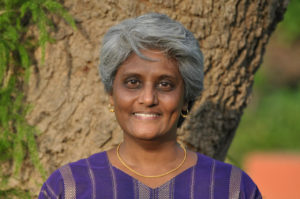
Modern Myths of Human Power – Part I
by Usha Alexander
[This is the sixth in a series of essays On Climate Truth and Fiction, in which I raise questions about environmental distress, the human experience, and storytelling. It first appeared on 3 Quarks Daily. This sixth essay is divided into three parts. The fifth essay in the series, called ‘Lost and Found in Eden’ is here.]
“The American way of life is not up for negotiation.” –George HW Bush to the assembled international diplomats at the Earth Summit in Rio de Janeiro, 1992
“Much talk. Talking will win you nothing. All the same, the woman goes with me to the house of Hades.” –Thanatos to Apollo in a scene from Alcestis by Euripides, 5th Century, BCE.
***

In Classical Greek mythology, Thanatos was Death. As a minor god who got little press in the surviving tales, he appears in the play, as something of a functionary, dutifully gathering those whose time had come and spiriting them to the underworld. Not that he doesn’t find some satisfaction in his work, but he wields his power neither masterfully nor hungrily. The touch of Thanatos did not bring on death from war or violence – those deaths were the domain of other deities – but an ordinary death, as experienced by most. In ancient times, Thanatos was often depicted as a winged youth, as a babe in the arms of his mother, Nyx, goddess of Night, or with his twin, Hypnos, Sleep. Thanatos was not a villain. But he was ruthlessly inevitable.
In the 21st Century Marvel film franchise, Thanatos has been reinvented as Thanos. In this reimaging, Thanos still wields death, but he sees his job in larger terms: he wants to bring peace to the universe, which is engulfed in strife. “Too many mouths. Not enough to go around,” he explains, referring to the overpopulation of the Marvel Universe. Thanos’s solution is to reduce the number of living things through a painless existential cleanse that will magically drift across the universe, gently annihilating half of everybody. He understands himself as the only being possessed of both will and power enough to act upon the need of the hour – to turn every other being into dust, thus restoring balance and enabling peace among the untold trillions who will survive. His desire to erase half of all the living isn’t personal, nor is it inspired by cruelty, venality, or a lust for power. Like his Greek inspiration, Thanos is pragmatic, goal-oriented, and transactional. Though he’s depicted with the stature of a supervillain, in command of limitless legions of grotesque warriors, he’s motivated by a sense of duty: the universe is out of balance and must be set right. “I am inevitable,” he quietly declares.
But, for his heartlessness, Thanos is set upon by the full pantheon of the Marvel Universe demi-gods, the so-called Avengers – a collective of winsome and righteous superheroes – who do not accept inevitability, limitations, or balance. To defeat this supervillain, the Avengers pound their way through a series of epic battles that rage for some five hours of high – CGI viewing in two back-to-back blockbuster films. I don’t think I’m giving anything away to say here that, in the end, the Marvel superheroes win their war.
These two films, Avengers: Infinity Wars (2018) and Avengers: Endgame (2019), became the highest grossing superhero films of all time – and by a good margin – capping off a monumental saga spanning twenty-two films released over the past decade, each of which earned on average nearly a billion dollars at the box office. Presumably, films become such mega-blockbusters, in large part, because they tap effectively into something of the current Zeitgeist, telling a story that audiences want to hear. Many such blockbusters and classic films have become our modern folk stories, providing a vernacular of metaphors, presumptions, and expectations about our world, generating broad conversations, popular analysis, and living threads of storytelling across people of diverse backgrounds and social locations. Stories powerfully tap into our prevalent paradigms, beliefs, and notions, amplify and edify them – or chip away at them. And if, as I’ve suggested in my previous essays in this series, ancient folktales and myths reveal something about our collective understanding of how the world works, or should work, then so do these blockbuster Avenger flicks.

In this context, I find contrasts between our 21st century American superhero tales and those of the ancient past revealing of changes in how we’ve come to see our place in the world. In the earliest stories, reflecting a nomadic-foraging way of life, human characters are cast as creatures who live in negotiation with other animals and are beholden to stronger forces of nature, including the weather, often represented as gods or spirits. Among agriculturalists, humans are decidedly more important than animals, in the eyes of the gods, but gods still hold sway over human fate, still dictate what is and isn’t possible. Heroes can only respond to the decisions or desires and actions of the gods, who themselves are increasingly anthropomorphized.
But in our modern American myths, humans are the gods – or at least, godlike. Some of our most popular and widely-disseminated mythic stories describe heroes of super-human power saving the world from dark forces that seek to disrupt our way of life. While this may sound like an obvious formulation to us, it’s quite different from some of the most popular hero tales of the ancient world. But, as with our ancestors, the stories we tell today provide insights into how we arrived at our modern paradigms and how we inhabit our moment on Earth. Crucially, they may also guide or limit our responses to the global predicament we face with climate change and mass extinction.
[End of Part I]
[ Modern Myths of Human Power – Part II ]

Usha Alexander was born to Indian immigrants who came to the United States in the 1950s and settled in the very small town of Pocatello, Idaho. She ran away to university at the age of 19, and later joined the US Peace Corps, where she served as a science teacher in the archipelago nation of Vanuatu. In the late 90s, Usha made her way to the San Francisco Bay Area of California, where she settled and worked for Apple Computer for many years.
Since 2013, Usha resides with her partner, writer and photographer, Namit Arora, in the National Capital Region of India. Usha has lived in four different countries and has learned to carry her home within herself, yet she frequently returns to the CA Bay Area with a certain sense of homecoming.